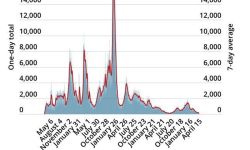Michigan health care workers say they need more coronavirus protection


As coronavirus cases continue to climb in Michigan, front-line health care workers warn that some hospitals are running dangerously short of protective gear workers need to keep them (and patients) safe, leaving them vulnerable to infection.
Some health workers told Bridge their hospitals are already rationing use of N95 respirator masks, which experts say offer the best protection against the coronavirus. If that supply runs out, they warn, that jeopardizes the health care system and puts patients at risk of infection.
Carrie DelBene, an anesthesiologist, said she is among the doctors at Beaumont Hospital Dearborn summoned to put patients on a ventilator — a common treatment for seriously ill patients with respiratory difficulties tied to COVID-19, the disease caused by the new coronavirus.
Attaching a ventilator can release a cloud of tiny airborne viral particles, including from coronavirus, putting anyone close to the patient at risk.
But as of a few days ago, DelBene said, her anesthesiology department had just 10 of the N95 respirator masks. Beaumont announced Saturday it was caring for the first Beaumont patient who tested positive for the virus. (Beaumont announced Wednesday that a patient had died from COVID-19, the first such death announced in Michigan; but it’s unclear if this is the same person.)
“I would say we are in very short supply,” DelBene told Bridge.
“We are worried. I feel like looking at all the reports coming in, we are going to see more cases. If we all get exposed here, there wouldn’t be anybody to take care of the patients when they come in.”
DelBene added that to her knowledge the hospital has just one size of the specialized N95 masks, which are regarded as much safer to protect against the spread of the coronavirus. Medical standards say that proper fit, including the correct size, is “critical” for their performance.
“You could be exposed because of that,” DelBene said of not having the mask properly sized or fitted.
Michigan Gov. Gretchen Whitmer said during a press conference Wednesday that the availability of medical supplies — including masks but also testing, ventilators and other resources — is a major worry.
“We are concerned about the system being overtaxed, and we're concerned about not having enough tests to do all the tests we believe are necessary,” Whitmer said.
State officials “don’t have a comprehensive understanding” of the supplies hospitals around the state currently have and how many they need, said Chief Medical Executive Dr. Joneigh Khaldun. While they have reports of stocks from certain hospitals, they’re working on getting a more comprehensive picture of the state’s resources, she said.
A nurse anesthetist at Beaumont Dearborn — who also intubates patients — told Bridge the count of N95 masks in her department was down to seven as of Monday. She declined to give her name because she is employed by the hospital and not authorized to speak to the media.
She said about 30 concerned anesthetists and anesthesiologists met Tuesday morning with hospital officials. She said health care workers asked if the hospital had a plan for protecting them as they treat coronavirus patients and she says they were told by an administrator, “We’re working on it.”
“I am worried that we could be carrying [coronavirus] and, if we are, we are spreading it to other patients and the community at large, the nurse anesthetist said. “I came into this profession to help people. If I am doing the opposite, that is not acceptable to me.”
A respiratory therapist at Henry Ford Wyandotte Hospital told Bridge she has had to treat patients with flu-like symptoms in recent days with no access to N95 masks.
“We’ve been told to call our central distribution for the mask. Other times, we have been told they are on the floor and we can find them. There’s other times we haven’t had access to them, whether they are out, or they are restricting them, I don’t know.”
The therapist said hospital officials have given conflicting information about whether they should use N95 or surgical masks to treat patients.
“It’s very troubling. We just feel very much in limbo right now on the information we are getting.”
Henry Ford Health System issued a statement Wednesday from Adrian Munkarah, its chief clinical officer: “The safety of our patients and staff is our top priority. We are in constant communication with our suppliers and are continuing to take measures to extend the life of our supplies...We will continue to seek the CDC’s counsel and balance that with our own equipment monitoring and care model response.”
Other health care workers say they face this mask protection dilemma as well.
RELATED:
- Michigan coronavirus Q&A: Reader questions answered
- How to make your own hand sanitizer during coronavirus shortage
- Can I get tested for coronavirus in Michigan and other questions answered
- Here’s a map of where Michigan kids can get meals during school closure
- The first line of defense against coronavirus: Try soap, not a mask
Dental hygienist Terry Roberts has been going to work each day at a small Allen Park dental office – hovering inches from the mouths of patients – without access to N95 masks.
“I am right up there in their face,” she told Bridge.
Roberts says she does so wearing a surgical mask she realizes may not protect her.
“The virus can filter right through that,” she said.
She said her office tried to get its hands on N95 masks.
No dice.
“All of our suppliers no longer had N95 masks,” she said.
Gov. Gretchen Whitmer has been more vocal in her concern in recent days that coronavirus could overwhelm Michigan hospitals because of looming shortages of protective gear and ventilators needed to treat patients.
“We’re worried because we need personal protection equipment, we need respirators and ventilators,” she said in an appearance Monday on CNN. “We need to expand our health care facilities that are going to get overrun because people are legitimately concerned about their health.”
President Trump raised the ire of some governors earlier Monday, when it was reported he told them not to expect the federal government to fill the growing demand for respirators and masks needed to treat people with coronavirus.
“Respirators, ventilators, all of the equipment — try getting it yourselves,” he reportedly said in a conference call.
On Wednesday, Whitmer said in a television appearance on MSNBC she is in talks with Michigan companies about producing medical gowns and other needed items to fight the coronavirus pandemic.
She also said the state is also looking at going directly to the World Health Organization for coronavirus tests, after the federal government reportedly did not work with WHO to obtain testing kits for the U.S.
In the meantime, dozens of U.S. health care workers have fallen ill with covid-19 and others are quarantined after exposure to the virus.
Liam Yore, a board member of the American College of Emergency Physicians, said in a story posted Tuesday by the Washington Post: “The risk to our health care workers is one of the great vulnerabilities of our health care system in an epidemic like this.”
In China, nearly 3,400 health care workers have come down with the virus and 13 have died.
In Italy, 10 percent of health care workers were infected by coronavirus in the northern region hardest hit by the virus. That’s led to the near-collapse of the healthcare system, as patients are wheeled into crowded hallways and doctors are making decisions about which patients to treat and which to let die.
And what’s unfolded in Washington state could be a warning for where Michigan might be in a few weeks. Washington reported its first coronavirus case on Jan. 21. It had 52 deaths and more than 1,000 cases as of Tuesday.
Its rapid spread is straining that state’s health care system.
Earlier this month, Washington state health officials asked for 233,000 respirators from the Strategic National Stockpile ─ the federal store of emergency medical supplies ─ amid growing signs of shortages.
There are reports of hospitals in Washington state directing health care workers to re-use masks or wear them for extended periods because of shortages. A nurse from a Tacoma hospital said that nurses who would typically go through 36 masks in a 12-hour shift were being asked to use a single one for the duration of their shift.
Until earlier this month, the Centers for Disease Control and Prevention recommended N95 masks as the standard facial protection for health care workers treating patients with coronavirus disease. But a shortage of the masks prompted health officials to loosen that standard.
It posted new guidelines March 10 that said “the supply chain of respirators cannot meet demand” and that surgical masks should be considered “an acceptable alternative."
That contradicted other federal guidelines, including a previous statement issued by the Occupational Safety and Health Administration which said: “Surgical masks are not designed or certified to prevent the inhalation of small airborne contaminants. These particles are not visible to the naked eye but may still be capable of causing infection. Surgical masks are not designed to seal tightly against the user's face.”
N95 masks, by contrast, are designed to form a tight seal around the user’s mouth and nose and filter out small viral particles that can get through a surgical mask or air gaps at the edge of the mask.
The American Association of Nurse Anesthetists also issued guidelines for health care safety stating in part: “At a minimum, N95 masks should be used for all known or suspected cases of COVID-19.”
The CDC’s shift in protection standards, sanctioning use of surgical masks, was met with protest from union groups representing health care workers including National Nurses United, which said the changes “will gravely endanger nurses, healthcare workers, patients, and our communities.”
Jamie Brown, president of the Michigan Nurses Association, condemned the switch in standards in a recent statement as well: “We can’t afford shortcuts when people’s lives are at risk. The use of surgical (paper) masks is an unacceptable alternative to the proper equipment when working with someone suspected or confirmed to have COVID-19. The safest equipment is an N95 mask or greater.”
Bridge reached out to other Michigan hospital systems to ask if they had adequate supplies of N95 masks and whether they approved surgical masks as an acceptable alternative for health care workers.
Neither Grand Rapids-based Spectrum Health nor Traverse City-based Munson Healthcare gave a direct answer on their supply of N95 masks. They issued statements that suggested they would use other masks as an acceptable substitute.
Bruce Rossman, spokesperson for Spectrum Health, said in a statement: “There is currently a national shortage of N95 masks but the CDC, along with national and state agencies, are aware of it and actively involved in resolving this issue. Spectrum Health is following CDC guidelines for acceptable alternatives. Supplies are continually prioritized based on the treatment and care needs of our patients. We are working to manage this ever-changing situation.”
Munson Healthcare spokesperson Dale Killingeck said in a statement that the supply of personal protective equipment “is a concern for every healthcare facility right now.
“The World Health Organization is reporting a global shortage that is requiring suppliers to ration and conserve resources in order to manage COVID-19 long term. Munson Healthcare and each of its entity hospitals are designing protocols and managing its PPE according to CDC and WHO guidelines to first and foremost, protect our staff and patients but also maintain a supply as this situation continues to develop.”
See what new members are saying about why they donated to Bridge Michigan:
- “In order for this information to be accurate and unbiased it must be underwritten by its readers, not by special interests.” - Larry S.
- “Not many other media sources report on the topics Bridge does.” - Susan B.
- “Your journalism is outstanding and rare these days.” - Mark S.
If you want to ensure the future of nonpartisan, nonprofit Michigan journalism, please become a member today. You, too, will be asked why you donated and maybe we'll feature your quote next time!



